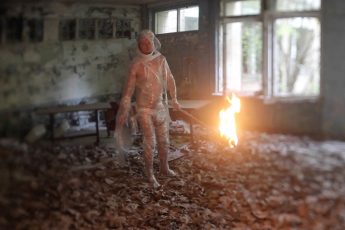Looking back at the 90’s
Tudor Giurgiu’s Of Snails and Men (2012)
Vol. 19 (July 2012) by Alina Popescu
Of Snails and Men is the story of the wild privatization that occurred in Romania in the aftermath of Communism. The film is a bitter-sweet comedy, turning back with irony to a period that many Romanians – concerned with much more immediate problems – have put on stand-by. But those times are still a part of the collective memory, and this seems to be the stake of the director’s bet with the public. What is interesting about this movie is foremost the choice of revisiting that period from today’s perspective.
After the first shots everything becomes clear and what follows goes without saying: we are in Romania of the 90’s, when the prosperous state enterprises are sold for nothing, when people are naively hopeful and dream about the promises of Western civilization.
The film centers around a couple of workers in a car factory. Some French businessmen wants to buy it in a private arrangement with the director, a deal also backed by politicians. The workers happen to find out that the factory will not reduce the personnel – it will definitely close down. One young trade-unionist (played by the formidable Andi Vasluianu) takes the question seriously and tries to rally his colleagues in order to save the factory. The solution would be that they buy the factory themselves. But the question remains how they can do it.
The solution comes by accident: a newspaper advertises that a private medical clinic is looking for sperm donators. Their solidarity spirit still working, the workers go together to Bucharest, determined to donate as much as needed. But as they reach the clinic, they find out that they have to compete with Danish students. Capitalism also defeats the provision of sperm. The Communist workers are not wanted. Admitting the failure and becoming increasingly disillusioned, they return to their homes. Still, the film ends on a happy note, the workers succeeding to find a job as snails pickers – for export.
Parallel to this grande histoire of privatization, there are also a few stories about love, emigration dream, and about the exoticism of the encounter between East and West. The film is a kind of synthesis of tropes favored by the cinematographic trend of so-called “transition films” that appeared in Romania in the 90’s. Among these are the unforgettable Asphalt Tango (1996) by Nae Caranfil or The Snails’ Senator (Senatorul melcilor, 1995) by Mircea Daneliuc, and, the most recent one, Cristian Mungiu’s Occident (2002). Even the title of the film is a sort of postmodern quotation of Daneliuc’s film, while Dorel Visan, who was the “snails’ senator” in Daneliuc movie, is reconfirmed as a cinematographic epitome of the new domestic capitalist figures (a role that suits him very well).
Unlike the films just mentioned, this comedy by Giurgiu is more sweet than it is bitter. The drama is not collective, but rather personal, and the overall feeling is optimistic. Inrdeed, the film is a very reliable reconstruction of the Romanian way of life of that period.




Leave a Comment